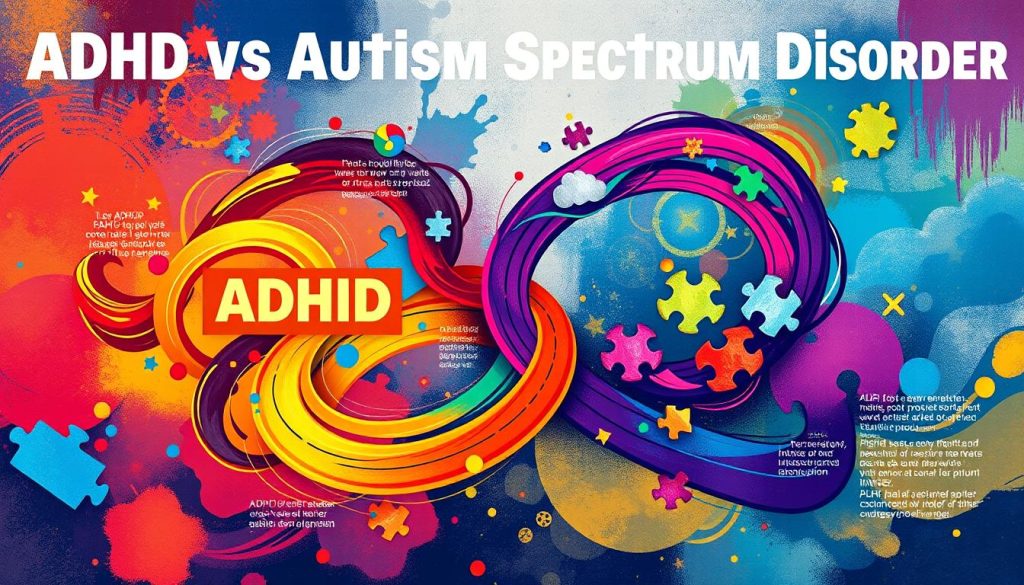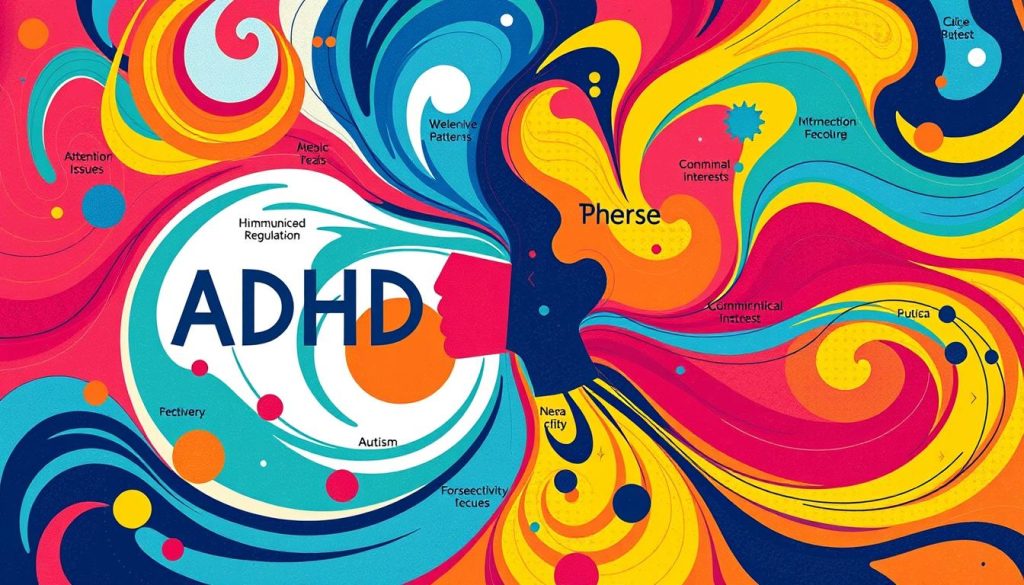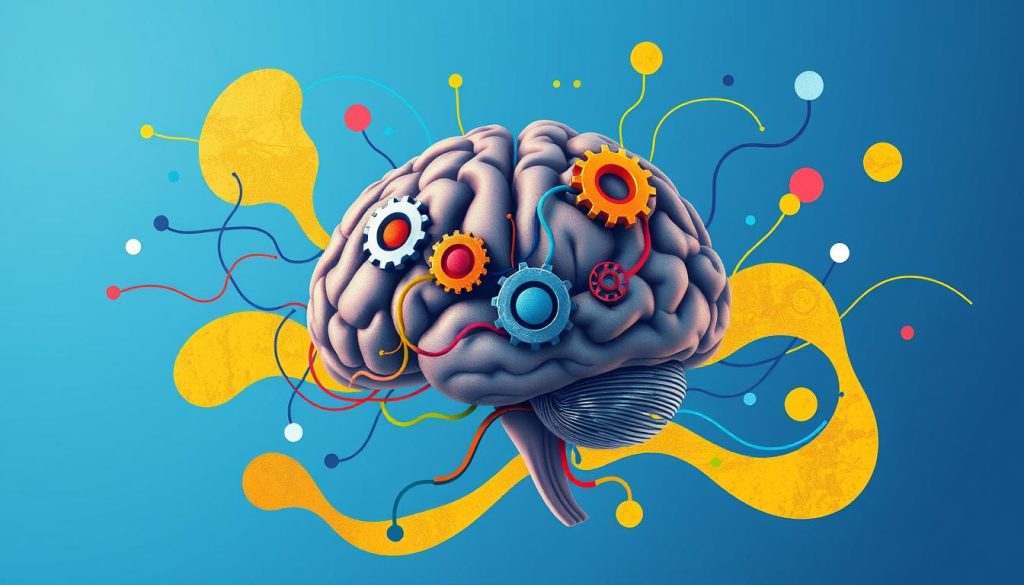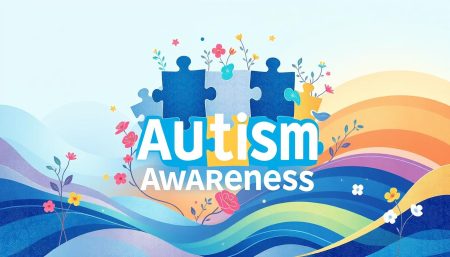Neurodevelopmental disorders like ADHD and autism spectrum disorder (ASD) often spark curiosity about their connection. These conditions can profoundly impact a person’s life, affecting behavior, learning, and social interactions.
While ADHD and autism spectrum disorder share some similarities, they are distinct conditions with unique characteristics. Understanding their relationship is key for accurate diagnosis and effective treatment. Let’s explore how these neurodevelopmental disorders intersect and differ, shedding light on their complex interplay.
The Complex Connection Between ADHD and Autism
ADHD and autism are complex neurodevelopmental disorders. They often share symptoms and challenges. Understanding their connection is key for accurate diagnosis and treatment. Let’s dive into how these conditions relate and their impact on individuals.
Defining Neurodevelopmental Disorders
Neurodevelopmental disorders affect brain function and behavior, usually appearing in childhood. ADHD and autism are part of this group, along with dyslexia and intellectual disabilities. These disorders can greatly affect daily life, social interactions, and learning.
Historical Understanding of Both Conditions
ADHD and autism were once seen as separate conditions. ADHD was first described in the early 20th century, and autism in the 1940s. As research progressed, similarities and overlaps were noted. This raised questions about whether ADHD is on the autism spectrum.
Current Scientific Perspectives
Today, scientists see ADHD and autism as sharing genetic and neurological traits. Though they are distinct diagnoses, many people have symptoms of both. This overlap has sparked more research into their connections and effects on brain function and behavior.
| Aspect | ADHD | Autism |
|---|---|---|
| Main Characteristics | Inattention, Hyperactivity, Impulsivity | Social Challenges, Repetitive Behaviors, Communication Difficulties |
| Prevalence | 5-7% of children | 1-2% of children |
| Comorbidity Rate | 30-50% with autism symptoms | 30-80% with ADHD symptoms |
Is ADHD on the Autism Spectrum?

Many experts debate if ADHD is part of the autism spectrum. While both ADHD and autism spectrum disorder share some symptoms, they are different conditions. Both are neurodevelopmental disorders, affecting brain development and function.
Studies have found that ADHD and autism spectrum disorder can share symptoms. These include:
- Difficulty with social interactions
- Trouble focusing
- Impulsive behaviors
Even with these similarities, ADHD is not seen as part of the autism spectrum. Each disorder has its own unique characteristics. For example, autism often includes repetitive behaviors and intense interests, which are not common in ADHD.
Experts agree that ADHD and autism can happen together, but they are separate conditions. A person might have both, but that doesn’t mean ADHD is part of the autism spectrum. Knowing the differences helps in giving the right support and treatment for those with either or both disorders.
Key Differences Between ADHD and Autism Spectrum Disorder
It’s important to know the differences between ADHD and autism spectrum disorder. This helps in making the right diagnosis and treatment. Both conditions share some symptoms, but they are different in how people interact, communicate, and behave.
Social Interaction Patterns
Children with ADHD might have trouble with social cues because they are easily distracted or act impulsively. They might interrupt others or find it hard to wait their turn. On the other hand, kids with autism find it hard to understand social rules and read nonverbal signals.
Communication Styles
How people communicate is a big difference between ADHD and autism. Kids with ADHD might talk a lot or have trouble staying on one topic. Those with autism might speak later, repeat words or phrases, or find it hard to understand abstract ideas.
Behavioral Characteristics
ADHD and autism show different behaviors. ADHD is often marked by hyperactivity and acting without thinking. Autism is known for repetitive actions and a strong focus on specific interests.
| Aspect | ADHD | Autism Spectrum Disorder |
|---|---|---|
| Social Interaction | Difficulty with turn-taking, interrupting | Trouble understanding social norms |
| Communication | Excessive talking, off-topic conversations | Delayed language, repetitive speech |
| Behavior | Hyperactivity, impulsivity | Repetitive behaviors, intense interests |
It’s key for doctors to understand these differences. This helps them use the right criteria for diagnosis and create treatment plans that fit each person’s needs.
Common Symptoms and Overlapping Traits
ADHD and autism spectrum disorder share many symptoms, making it hard to tell them apart. This can confuse parents, teachers, and doctors. It’s key to understand these shared traits for the right diagnosis and treatment.

Both conditions often cause behavioral problems that affect daily life. Kids with ADHD or autism might have trouble:
- Staying focused on tasks
- Being too impulsive and active
- Following instructions
- Getting along with others
ADHD and autism have some similar behaviors in their diagnostic criteria. For example, both might show repetitive movements or fidgeting. But, the reasons behind these behaviors are different for each condition.
Even though there’s overlap, each disorder has its own unique signs. A detailed check by a skilled professional is needed to tell ADHD from autism. This ensures the right diagnosis and treatment for those dealing with these challenges.
Diagnostic Criteria and Assessment Methods
Figuring out ADHD and autism needs a detailed check-up. Experts use certain rules to figure out these issues. Starting early and getting the right help can really help.
Professional Evaluation Process
Getting a diagnosis takes several steps. Doctors talk to parents, teachers, and the person themselves. They watch how they act and have conversations. This careful method helps get the right diagnosis.
Screening Tools and Tests
There are many tools to help figure out these conditions. These include questionnaires, rating scales, and brain tests. Some well-known ones are:
- ADHD Rating Scale
- Autism Diagnostic Observation Schedule (ADOS)
- Conners Complete Behavior Rating Scales
- Social Responsiveness Scale
Differential Diagnosis Challenges
It’s hard to tell ADHD from autism apart. They share many signs, making it hard to decide. Doctors have to think about things like:
| ADHD | Autism |
|---|---|
| Inattention | Social communication problems |
| Hyperactivity | Repetitive actions |
| Impulsivity | Sensory sensitivities |
Getting the right diagnosis is key. It helps make a good plan for support. It also helps people find the right help for their needs.
The Role of Executive Function in Both Conditions
Executive function is vital for managing daily tasks and controlling impulses. It helps us stay focused and organized. People with ADHD and autism often struggle with these skills.

Those with ADHD may find it hard to organize and manage time. On the autism spectrum, executive function issues can impact social skills and planning. These challenges spark debate about the connection between ADHD and autism.
Improving executive function is essential. Experts suggest breaking tasks into smaller steps and using visual aids. These strategies help individuals with ADHD or autism tackle daily tasks more effectively.
Studies are ongoing to understand the role of executive function in ADHD and autism. This research guides treatments and supports for those affected. It helps families and educators provide better help.
Understanding Sensory Processing Differences
Sensory processing differences are key in ADHD and autism spectrum disorders. They cause unique sensory overload patterns. This requires special support strategies and early help.
Sensory Overload Patterns
Those with ADHD or autism face sensory overload in different ways. Some are very sensitive to loud sounds or bright lights. Others might look for intense sensory experiences. Knowing these patterns helps in finding the right support.
Environmental Adaptations
Making a space sensory-friendly can lessen behavioral issues. This could mean:
- Soft lighting instead of harsh fluorescent bulbs
- Noise-canceling headphones in loud places
- Quiet areas for sensory breaks
These changes can greatly help manage sensory overload.
Coping Strategies
Teaching coping strategies is vital in early intervention. Useful methods include:
- Deep breathing exercises
- Fidget toys for sensory input
- Practicing mindfulness for body awareness
These strategies help manage sensory experiences and lower behavioral challenges.
Social Skills and Relationship Challenges
Those with ADHD and autism often face social hurdles. These challenges can make relationships tough. Kids might find it hard to make friends, and adults may struggle in dating or work.

Behavioral challenges vary between ADHD and autism. ADHD folks might talk too much or interrupt. Autistic individuals might avoid eye contact or miss social cues. Early intervention and support strategies can help both.
Social skills training is key for both conditions. It teaches how to start conversations and read body language. Role-playing and group activities are important parts of this training.
| Social Skill | ADHD Challenge | Autism Challenge |
|---|---|---|
| Starting Conversations | May talk excessively | May struggle to initiate |
| Listening | Often distracted | May focus on specific topics |
| Reading Social Cues | Can miss subtle hints | Often struggles with nonverbal cues |
Support strategies include social stories, visual aids, and structured activities. These tools help simplify complex social rules. With the right help, people with ADHD and autism can build strong relationships.
Treatment Approaches and Interventions
Treating ADHD and autism spectrum disorders needs a custom plan. Early help is key to managing symptoms and better outcomes. Let’s look at the different treatment options for these conditions.
Behavioral Therapies
Behavioral therapies are a mainstay for ADHD and autism. They include cognitive-behavioral therapy, social skills training, and applied behavior analysis. These help people develop coping strategies and enhance social skills.
Medication Options
For ADHD, doctors often prescribe stimulant meds like methylphenidate and amphetamines. In autism, meds might help with symptoms like irritability or aggression. It’s vital to work with a doctor to find the right medication and dosage.
Alternative Treatments
Some families try alternative treatments like dietary changes, supplements, or mindfulness practices. While these might help some, it’s key to talk about them with a healthcare provider.
Support strategies go beyond just medical treatment. They include setting up structured environments at home and school, using visual aids, and following routines. For those with comorbidities, a treatment plan that addresses all conditions is necessary.
Remember, there’s no single solution for everyone. The best approach usually combines different treatments tailored to the individual’s unique needs and challenges.
Support Strategies for Daily Living
Living with ADHD or autism can be tough. Good support strategies can really help with daily tasks and make life better. Starting early to tackle behavioral challenges is very important.

Creating a structured routine is key. It helps reduce stress and anxiety for those with ADHD or autism. Visual schedules are great, showing what to do and when.
Creating a sensory-friendly space is also vital. Lowering noise, using soft lights, and comfy seats can help avoid sensory overload. This makes it easier to focus.
- Use timers to break tasks into manageable chunks
- Implement reward systems for completing tasks
- Provide clear, concise instructions for activities
- Encourage regular exercise to improve focus and reduce stress
Technology is a big help too. Apps for organization, time management, and social skills can be very useful. They help with daily tasks and support independence.
| Daily Living Area | Support Strategy | Benefit |
|---|---|---|
| Personal Hygiene | Visual step-by-step guides | Promotes independence in self-care |
| Meal Planning | Color-coded meal prep containers | Simplifies nutrition management |
| Home Organization | Labeled storage systems | Reduces clutter and anxiety |
| Time Management | Digital reminders and alarms | Improves punctuality and task completion |
Every person is different, so support strategies need to fit their needs. Regular checks and changes to these strategies help keep them effective in tackling daily challenges.
Educational Accommodations and Support Systems
Schools are key in helping students with ADHD and autism. They offer support strategies to help these students do well in school. Let’s look at what makes a good support system.
School-Based Interventions
Starting early is important to tackle behavioral issues. Schools use many ways to help students:
- Structured routines
- Visual schedules
- Quiet spaces for sensory breaks
- Assistive technology
IEP and 504 Plans
IEPs and 504 Plans offer custom support. They outline specific help and goals for each student. Some common things include:
| IEP Components | 504 Plan Features |
|---|---|
| Specialized instruction | Classroom accommodations |
| Related services (e.g., speech therapy) | Testing modifications |
| Annual goals | Behavioral support strategies |
Teacher Training and Support
Teachers need the right tools to help. Training helps them use effective strategies. Important areas include:
- Understanding neurodevelopmental disorders
- Adapting teaching methods
- Managing behavioral challenges
- Collaborating with families
By using these methods, schools make places where all students can thrive. Early help and ongoing support lead to great results in school and life.
Impact on Family Dynamics and Relationships
Living with ADHD or autism spectrum disorder changes family life a lot. These conditions affect not just the person with the condition but everyone at home. Parents, siblings, and partners often face special challenges in understanding and supporting their loved ones.
Families with ADHD or autism may feel more stressed. They need to manage constant supervision, behavioral challenges, and other health issues. This can put a lot of pressure on parents, and siblings might feel left out or resentful.
It’s important to have good support strategies to keep family relationships strong. Talking openly, learning about the conditions, and getting professional help can help a lot. Family therapy is a great way to talk about problems and find ways to deal with them.
- Establish consistent routines and clear expectations
- Create a calm, organized home environment
- Encourage positive reinforcement for desired behaviors
- Set aside quality time for each family member
By working together and using the right support strategies, families can grow closer. Remember, every family’s path is different. Finding what works best may take time and patience.
Research Developments and Future Perspectives
Recent studies are uncovering the complex link between ADHD and autism spectrum disorder. Scientists are looking into if ADHD is part of the autism spectrum. These neurodevelopmental disorders often share similar traits. This research aims to deepen our understanding of both conditions and their possible connections.
Brain imaging techniques are a key area of study. These advanced tools help researchers map brain activity in people with ADHD, autism, or both. By comparing these patterns, scientists aim to find specific neural pathways involved in each disorder. This could lead to more precise treatments and interventions in the future.
Genetic research is also showing promise. Scientists are finding genes that may influence both ADHD and autism. This could help explain why these conditions often occur together. It may also lead to personalized medicine approaches. As we learn more about the genetic factors, we may develop new therapies that address the root causes of these disorders.
Looking to the future, researchers are exploring new treatment strategies. These include brain-computer interfaces, virtual reality therapy, and mindfulness-based interventions. By combining these innovative approaches with traditional methods, we may soon have more effective ways to support individuals with ADHD, autism, or both conditions.
FAQ
Q: Is ADHD considered part of the autism spectrum?
A: ADHD and autism are both neurodevelopmental disorders. They share some symptoms but are not the same. ADHD is not part of the autism spectrum. They have different criteria for diagnosis, but they can happen together.
Q: What are the main differences between ADHD and autism?
A: ADHD and autism have different ways of interacting and communicating. People with autism might find it hard to talk and have strong interests. Those with ADHD often struggle to focus and control impulses.
Q: Can a person have both ADHD and autism?
A: Yes, it’s possible for someone to have both ADHD and autism. This is called comorbidity. Studies show that 50-70% of people with autism also have ADHD.
Q: How are ADHD and autism diagnosed?
A: Doctors diagnose ADHD and autism through detailed evaluations. They look at behavior, developmental history, and use special tests. The DSM-5 provides the criteria for each condition.
Q: What are some common symptoms that overlap between ADHD and autism?
A: Symptoms like social issues, attention problems, impulsivity, and sensory issues are common in both. But, how these symptoms show up can differ.
Q: How does executive function relate to ADHD and autism?
A: Both ADHD and autism often involve executive function challenges. These can include starting tasks, organizing, and managing emotions. But, the way these challenges appear can vary.
Q: What treatment options are available for ADHD and autism?
A: Treatments for ADHD and autism include therapy, medication, and educational support. The right plan depends on the person’s needs and symptoms.
Q: How can schools accommodate students with ADHD or autism?
A: Schools can help with IEPs or 504 plans. These plans might include extra time, special seating, and visual aids. Teacher training is also key for a supportive classroom.
Q: What impact do these conditions have on family relationships?
A: ADHD and autism can affect family life. They can make communication harder and increase stress. But, with the right support, families can stay strong and supportive.
Q: What are some current research developments regarding ADHD and autism?
A: Research is looking into the genetic and brain links between ADHD and autism. It’s also exploring new ways to diagnose and treat. This includes understanding what they have in common to help more effectively.


















